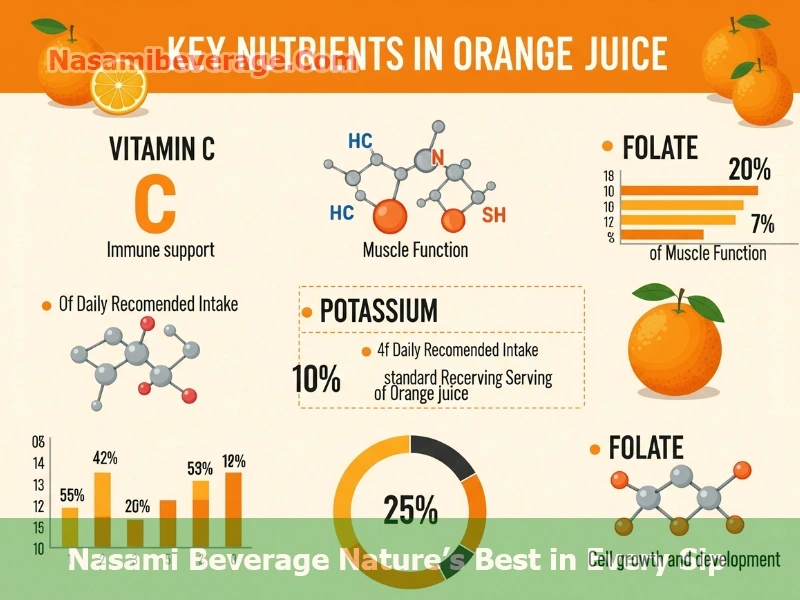Orange juice, a timeless breakfast favorite, continues to shine in 2025 as a refreshing, nutrient-packed beverage. Whether you’re sipping a glass from Nasami Beverage’s organic range or exploring its health benefits, orange juice remains a staple for health-conscious consumers and families alike. This article dives into the benefits, acidity levels, potential risks, and expert comparisons of orange juice, helping you make informed choices. From understanding its nutritional value to comparing fresh-squeezed versus store-bought options, we’ve got you covered with insights to elevate your orange juice experience.
Health Benefits of Orange Juice
Nutritional Value of Orange Juice
Orange juice is a powerhouse of essential nutrients, making it a go-to choice for boosting overall health. A single glass delivers a significant dose of vitamin C, an antioxidant that supports immune function and skin health. According to nutritionists, an 8-ounce serving provides approximately 120% of the daily recommended vitamin C intake.

Additionally, orange juice contains folate, potassium, and flavonoids, which contribute to heart health and reduce inflammation. Nasami Beverage’s organic orange juice, for instance, is crafted to retain these nutrients, offering a pure, refreshing option for daily consumption.
Supporting Your Immune System
Drinking orange juice daily can fortify your immune system, thanks to its high vitamin C content. This nutrient enhances white blood cell production, helping your body fight infections. Studies also suggest that the antioxidants in orange juice, such as hesperidin, may lower oxidative stress, promoting long-term health. For those seeking the best orange juice for immune system boost, opt for brands like Nasami Beverage, which prioritize natural ingredients without added sugars.
Is Orange Juice Bad for You?
Potential Risks of Overconsumption
While orange juice offers numerous benefits, moderation is key. Overconsumption can lead to concerns due to its natural sugar content, which averages 20–25 grams per 8-ounce serving. Excessive intake may contribute to weight gain or blood sugar spikes, particularly for individuals with diabetes.

Additionally, some store-bought varieties contain added sugars or preservatives, which can diminish health benefits. Choosing organic orange juice from trusted brands like Nasami Beverage ensures you avoid unnecessary additives.
Who Should Limit Intake?
Certain groups, such as those with acid reflux or sensitive stomachs, may need to limit orange juice consumption due to its acidity. People on low-sugar diets or with specific medical conditions should consult a healthcare provider. However, for most, enjoying orange juice in moderation as part of a balanced diet poses minimal risks.
Acidity of Orange Juice
Understanding pH Levels
Orange juice has a pH range of 3.3–4.2, making it acidic due to its natural orange acids, such as citric acid. This low ph value of orange juice is a clear indicator of its orange juice acidity. Many wonder, is orange juice acidic or basic? The answer is definitively that orange juice is acidic, with its orange juice ph level firmly in the acidic range. These orange acids contribute to its signature tangy flavor, but how acidic is orange juice can be a concern for some. Indeed, does orange juice have acid is a common question, and its low orange juice ph confirms it. For individuals with acid reflux or GERD, this acidity may trigger discomfort. In short, is oj acidic? Yes, it is.

However, the impact varies depending on the juice’s processing. Nasami Beverage’s cold-pressed orange juice is crafted to balance flavor and minimize the harsh effects of orange acids, offering a smoother, more enjoyable experience.
Mitigating Acidity Concerns
To enjoy orange juice without discomfort, especially for those sensitive to acidic foods and asking is orange juice good for acidity, consider diluting it with water to reduce the intensity of orange acids or pairing it with alkaline foods like yogurt to neutralize acidity. Opting for low-acid varieties or fresh-squeezed options can also lessen potential irritation. Always check labels for additives that may enhance the effects of orange acids in store-bought juices, ensuring a gentler choice for sensitive stomachs.
Orange Juice and Your Body
Effects on Digestion

Orange juice can support digestion due to its natural fiber content, particularly in fresh-squeezed varieties. The fiber aids in regulating bowel movements, while the juice’s enzymes promote gut health. However, highly processed juices may lack fiber, reducing this benefit. Nasami Beverage’s fresh options retain more natural fiber, making them a better choice for digestive health.
Impact on Energy and Hydration
The natural sugars in orange juice provide a quick energy boost, ideal for morning routines or post-workout recovery. Its high water content also aids hydration, making it a refreshing choice. For optimal benefits, pair orange juice with protein-rich foods to sustain energy levels throughout the day.
Fresh-Squeezed vs Store-Bought Orange Juice
Fresh-Squeezed – The Gold Standard
Fresh-squeezed orange juice, like that offered by Nasami Beverage, is made directly from whole oranges, preserving maximum flavor and nutrients. It typically contains no additives and has a shorter shelf life, ensuring purity. The juicing process retains more pulp and natural compounds, enhancing both taste and health benefits.
Store-Bought – Convenience with Caveats
Store-bought orange juice, such as brands like Tropicana or Minute Maid, offers convenience but often includes added sugars or preservatives. “From concentrate” varieties may lose some nutritional value during processing. When choosing store-bought, look for labels like “not from concentrate” or “organic” to ensure quality. Nasami Beverage’s organic orange juice stands out for its minimal processing and authentic flavor.
Expert Comparison
Nutrition experts recommend fresh-squeezed for superior taste and health benefits, especially for those prioritizing vitamin C in orange juice. However, high-quality store-bought options from brands like Simply Orange or Florida’s Natural can be viable alternatives if fresh isn’t accessible. Always check for certifications like USDA Organic to ensure quality.
Creative Uses for Orange Juice
Breakfast and Beyond
Orange juice is a breakfast classic, pairing perfectly with pancakes or oatmeal. Beyond breakfast, it’s a versatile ingredient in smoothies, marinades, or desserts. Try Nasami Beverage’s orange juice in a morning smoothie with berries and yogurt for a nutrient-packed start to your day.
Orange Juice Recipes to Try
- Orange Juice Smoothie: Blend 1 cup of Nasami Beverage orange juice, ½ cup frozen strawberries, 1 banana, and ¼ cup Greek yogurt for a refreshing treat.
- Citrus Salad Dressing: Mix ¼ cup orange juice, 2 tbsp olive oil, 1 tsp honey, and a pinch of salt for a zesty salad topper.
Where to Buy Orange Juice Online
Top Retailers for Fresh and Organic Options
For premium orange juice, explore online retailers like Amazon, Thrive Market, or Nasami Beverage’s official website. These platforms offer fresh orange juice delivery and organic options, ensuring convenience and quality. Nasami Beverage’s subscription service provides regular deliveries of cold-pressed juice straight to your door.
Tips for Finding Deals
Look for bulk discounts or seasonal promotions on sites like Thrive Market. Subscribing to newsletters from brands like Nasami Beverage can unlock exclusive offers, helping you save on organic orange juice purchases.
Explore More Orange Juice Guides
Dive deeper into the world of orange juice with additional resources. Discover the best organic orange juice brands for top recommendations or learn how to pick the healthiest orange juice for expert tips. For recipe inspiration, check out delicious orange juice recipes or explore why orange juice boosts immunity to understand its health impact. These guides, curated by Nasami Beverage, provide actionable insights for orange juice enthusiasts.
FAQs
Is orange juice good for you?
Yes, orange juice is rich in vitamin C and antioxidants, supporting immune function and overall health when consumed in moderation.
Why does orange juice taste bad after brushing teeth?
Toothpaste contains sodium lauryl sulfate (SLS), which suppresses sweet taste receptors and enhances bitter ones, making orange juice taste unpleasant.
Can diabetics drink orange juice?
Diabetics should consume orange juice cautiously due to its high sugar content. Choosing low-sugar or freshly squeezed options in moderation is advisable.
Where can I buy organic orange juice online?
Shop at Amazon, Thrive Market, or Nasami Beverage’s website for premium organic orange juice with convenient delivery.
This comprehensive guide to orange juice, curated by the team at Nasami Beverage, explores the vibrant world of this beloved beverage. From its immune-boosting benefits to its acidity and creative uses, we’ve covered everything you need to know to choose the best orange juice for your lifestyle. Whether you’re sipping Nasami Beverage’s organic orange juice or experimenting with new recipes, this article empowers you to make informed, health-conscious decisions.